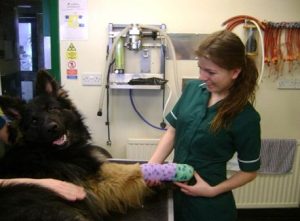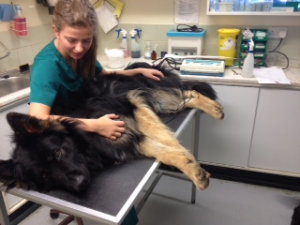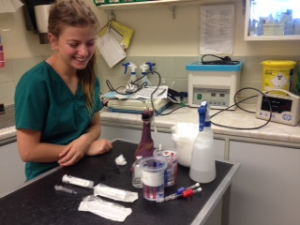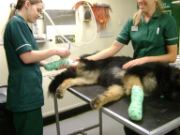The College of Animal Welfare’s annual Student Awards Ceremony which took place on Saturday 8 December was a huge success.
The highly anticipated award ceremony is a celebration of student achievements over the last year, not only at our centres, but also students who are learning in their work place all over the country. The awards recognise individual hard work, dedication and personal achievements.
This year the awards were presented by Professor Sue Gregory from the Royal Veterinary College in Potters Bar. Professor Gregory was appointed the worlds’ first Professor of Veterinary Nursing in 2008 and oversees the Royal Veterinary College’s veterinary nursing programmes in both the UK and in Hong Kong.
The Awards Ceremony is one of the biggest highlights of the year with all winners being presented with a commemorative trophy during the ceremony at our centre in Godmanchester, Cambridgeshire. A great day was had by all with friends and family sharing in the success of their loved ones.
Congratulations to all our winners – we wish you lots of luck and success for the future!
A full list of this year’s winners can be found below:
Level 2 Best Customer Service Student
Amanda Caley
Level 3 Best Customer Service Student
Amy White
Level 2 Best Horse Care Student
Abbie Grove-Cook
WBL Level 2 Animal Care Best Student
Natalie Brown
WBL Level 3 Animal Care Best Student
Jean Andrews
Huntingdon Centre Best 1st Year Animal Care Level 2 Student
Shaun Walton
Huntingdon Centre Best 1st Year Animal Care Level 3 Student
Daniel Jepson
Huntingdon Centre Best Final Year Animal Care Level 3 Student
Rebecca Haxell
Huntingdon Centre Best 1st Year Veterinary Nursing Student
Lauren McPherson
Huntingdon Centre Best Final Year Veterinary Nursing Student
Nicola Taylor
Best Level 2 Dog Grooming Student
Anne Selfe
London Centre Best 1st Year Veterinary Nursing Student
Becky Waite
London Centre Best Final Year Veterinary Nursing Student
Pauline Collier
Leeds Centre Best 1st Year Veterinary Nursing Student
Sean Ward
Leeds Centre Best Final Year Veterinary Nursing Student
Lucy Thompson
Best Veterinary Care Assistant (VCA) Student
Paula Harris
Best Veterinary Care Assistant (VCA) Mentor
Laura Hough
Best Clinical Coach (London)
Kim Fuller
Best Clinical Coach (Leeds)
Catherine Worwood
Best Clinical Coach (Huntingdon)
Michelle Palmer
Most Supportive Employer (London)
Palmerston Vets
Most Supportive Employer (Leeds)
Prospect Vets, Halifax
Most Supportive Employer (Huntingdon)
Animates Vet Clinic
Personal Achievement Certificates
Eboniepaige Hannan-Bobe
Heidi Quick
Emily Carter
Alys Brownridge
Stacey Grabecki
Philip Bandy
Amy White
Grace Bradford
Carlos Monks
Sarah Blundell
Paul Clinton
Hayley Buddery
Helen Key
Adriana Rosa
Gemma Armstrong
Rachel Hall
Zoe Reeve
Samantha Plitsch



